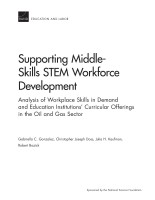| 来源类型 | Research Reports
|
| 规范类型 | 报告
|
| DOI | https://doi.org/10.7249/RR2899
|
| 来源ID | RR-2899-NSF
|
| Supporting Middle-Skills STEM Workforce Development: Analysis of Workplace Skills in Demand and Education Institutions' Curricular Offerings in the Oil and Gas Sector |
| Gabriella C. Gonzalez; Christopher Joseph Doss; Julia H. Kaufman; Robert Bozick
|
| 发表日期 | 2019
|
| 出版年 | 2019
|
| 页码 | 68
|
| 语种 | 英语
|
| 结论 |
Knowledge, skills not perfectly aligned- Instructors reported that they emphasized cross-cutting knowledge areas — those that are applicable to a variety of different courses and fields — more than occupation-specific areas. "Safety" was the most emphasized knowledge area. "Soft skills knowledge" (workplace competencies, such as being able to work in a team) was the second most-emphasized area.
- Instructors who partnered with industry tended to emphasize the skills that employers want more than instructors who did not have active partnerships.
- Instructors emphasized cognitive skills more than interpersonal skills in their courses.
- Syllabi often matched the knowledge areas and skills that instructors stated they emphasized. However, several knowledge areas and skills commonly emphasized in the survey were less frequently addressed in syllabi.
- Disconnects existed between the knowledge and skills employers sought and what instructors emphasized. A greater percentage of employers sought nontechnical skills in interpersonal and management knowledge areas compared to the percentage of courses that emphasized them. A greater percentage of instructors reported emphasizing technical and cognitive skills than the percentage of employers who reported seeking such skills. This suggests that, although these skills are in high demand, instructors may undervalue them in their courses.
- Instructors reported that students had the most difficulty with technical and academic knowledge areas in their courses, and with cognitive and management skills. There is a clear and positive association between instructors reporting that they needed more resources and also reporting more student difficulty.
|
| 摘要 |
- Employers, colleges, and third-party interest groups need to continue to collaborate and partner to bridge the gaps between the skills and knowledge employers seek from new hires in high-priority jobs and the skills and knowledge that instructors in STEM fields emphasize in courses. Encouraging dialogue between instructors and employers could result in more aligned curricula.
|
| 主题 | Education Curriculum
; Natural Gas
; Ohio
; Oil Shale
; Pennsylvania
; Postsecondary Education
; STEM Education
; Vocational Education
; West Virginia
; Workforce Development
|
| URL | https://www.rand.org/pubs/research_reports/RR2899.html
|
| 来源智库 | RAND Corporation (United States)
|
| 引用统计 |
|
| 资源类型 | 智库出版物
|
| 条目标识符 | http://119.78.100.153/handle/2XGU8XDN/108972
|
推荐引用方式
GB/T 7714 |
Gabriella C. Gonzalez,Christopher Joseph Doss,Julia H. Kaufman,et al. Supporting Middle-Skills STEM Workforce Development: Analysis of Workplace Skills in Demand and Education Institutions' Curricular Offerings in the Oil and Gas Sector. 2019.
|
|
文件名:
|
x1549463306522.jpg
|
|
格式:
|
JPEG
|

|
文件名:
|
RAND_RR2899.pdf
|
|
格式:
|
Adobe PDF
|
除非特别说明,本系统中所有内容都受版权保护,并保留所有权利。